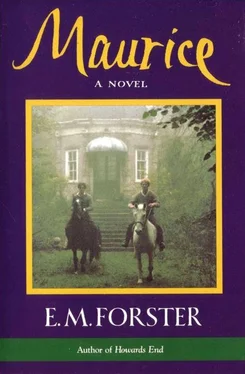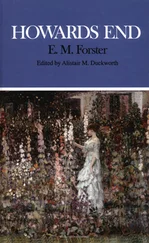Edward Forster - Maurice
Здесь есть возможность читать онлайн «Edward Forster - Maurice» весь текст электронной книги совершенно бесплатно (целиком полную версию без сокращений). В некоторых случаях можно слушать аудио, скачать через торрент в формате fb2 и присутствует краткое содержание. Город: New York, London, Год выпуска: 1993, ISBN: 1993, Издательство: W. W. Norton & Company, Жанр: Современная проза, на английском языке. Описание произведения, (предисловие) а так же отзывы посетителей доступны на портале библиотеки ЛибКат.
- Название:Maurice
- Автор:
- Издательство:W. W. Norton & Company
- Жанр:
- Год:1993
- Город:New York, London
- ISBN:0-393-31032-9
- Рейтинг книги:5 / 5. Голосов: 1
-
Избранное:Добавить в избранное
- Отзывы:
-
Ваша оценка:
- 100
- 1
- 2
- 3
- 4
- 5
Maurice: краткое содержание, описание и аннотация
Предлагаем к чтению аннотацию, описание, краткое содержание или предисловие (зависит от того, что написал сам автор книги «Maurice»). Если вы не нашли необходимую информацию о книге — напишите в комментариях, мы постараемся отыскать её.
Maurice — читать онлайн бесплатно полную книгу (весь текст) целиком
Ниже представлен текст книги, разбитый по страницам. Система сохранения места последней прочитанной страницы, позволяет с удобством читать онлайн бесплатно книгу «Maurice», без необходимости каждый раз заново искать на чём Вы остановились. Поставьте закладку, и сможете в любой момент перейти на страницу, на которой закончили чтение.
Интервал:
Закладка:
Presently they fell asleep.
They slept separate at first, as if proximity harassed them, but towards morning a movement began, and they woke deep in each other's arms. "Had I best be going now?" he repeated, but Maurice, through whose earlier night had threaded the dream "Something is a little wrong and had better be," was resting utterly at last, and murmured "No, no."
"Sir, the church has gone four, you'll have to release me."
"Maurice, I'm Maurice."
"But the church has —"
"Damn the church."
He said, "I've the cricket pitch to help roll for the match," but did not move, and seemed in the faint gray light to be smiling proudly. "I have the young birds too — the boat's done — Mr London and Mr Fetherstonhaugh dived splack into the water lilies — they told me all young gentlemen can dive — I never learned to. It seems more natural like not to let the head get under the water. I call that drowning before your day."
"I was taught I'd be ill if I didn't wet my hair."
"Well, you was taught what wasn't the case."
"I expect so — it's a piece with all else I was taught. A master I used to trust as a kid taught me it. I can still remember walking on the beach with him… oh dear! And the tide came up, all beastly gray. " He shook himself fully awake, as he felt his companion slip from him. "Don't, why did you?"
"There's the cricket —"
"No, there's not the cricket — You're going abroad."
"Well, well find another opportunity before I do."
"If you'll stop, I'll tell you my dream. I dreamt of an old grandfather of mine. He was a queer card. I wonder what you'd have made of him. He used to think dead people went to the sun, but he treated his own employees badly."
"I dreamt the Reverend Borenius was trying to drown me, and now really I must go, I can't talk about dreams, don't you see, or I'll catch it from Mr Ayres."
"Did you ever dream you'd a friend, Alec? Nothing else but just 'my friend', he trying to help you and you him. A friend," he repeated, sentimental suddenly. "Someone to last your whole life and you his. I suppose such a thing can't really happen outside sleep."
But the moment for speech had passed. Class was calling, the crack in the floor must reopen at sunrise. When he reached the window Maurice called, "Scudder," and he turned like a well-trained dog.
"Alec, you're a dear fellow and we've been very happy."
"You get some sleep, there's no hurry in your case," he said kindly, and took up the gun that had guarded them through the night. The tips of the ladder quivered against the dawn as he descended, then were motionless. There was a tiny crackle from the gravel, a tiny clink from the fence that divided garden and park: then all was as if nothing had been, and silence absolute filled the Russet Room, broken after a time by the sounds of a new day.
Having unlocked the door, Maurice dashed back into bed.
"Curtains drawn, sir, nice air, nice day for the match," said Simcox entering in some excitement with the tea. He looked at the head of black hair that was all the visitor showed. No answer came, and, disappointed of the morning chat Mr Hall had hitherto accorded, he gathered up the dinner-jacket and its appurtenances, and took them away to brush.
Simcox and Scudder; two servants. Maurice sat up and drank a cup of tea. He would have to give Scudder some handsome present now, indeed he would like to, but what should it be? What could one give a man in that position? Not a motor-bike. Then he remembered that he was emigrating, which made the problem easier. But the anxious look remained on his face, for he was wondering whether Simcox had been surprised at finding the door locked. Also had he meant anything by "Curtains drawn, sir"? Voices sounded under his window. He tried to drowse again, but the acts of other men had impinged.
"Now what will you wear, sir, I wonder?" inquired Simcox, returning. "You'll put on your cricketing flannels straight away perhaps; that rather than the tweed."
"All right."
"College blazer with them, sir?"
"No — never mind."
"Very good, sir." He straightened out a pair of socks and continued meditatively: "Oh, they've moved that ladder at last, I see. About time." Maurice then saw that the tips against the sky had disappeared. "I could have sworn it was here when I brought in your tea, sir. Still, one can never be certain."
"No, one can't," agreed Maurice, speaking with difficulty and with the sense that he had lost his bearings. He felt relief when Simcox had left, but it was overshadowed by the thought of Mrs Durham and the breakfast table, and by the problem of a suitable present for his late companion. It couldn't be a cheque, lest suspicions were aroused when it was cashed. As he dressed, the trickle of discomfort gathered force. Though not a dandy, he had the suburban gentleman's usual show of toilet appliances, and they all seemed alien. Then the gong boomed, and just as he was going down to breakfast he saw a flake of mud close to the window sill. Scudder had been careful, but not careful enough. He was headachy and faint when, clothed all in white, he at last descended to take his place in society.
Letters — a pile of them, and all subtly annoying. Ada, most civil. Kitty, saying his mother looked done up. Aunt Ida — a postcard — wanting to know whether the chauffeur was supposed to obey orders, or had one misunderstood? business fatuities, circulars about the College Mission, the Territorial training, the Golf Club, and the Property Defence Association. He bowed humorously over them to his hostess. When she scarcely responded, he went hot round his mouth. It was only that Mrs Durham's own letters worried her. But he did not know this, and was carried out further by the current. Each human being seemed new, and terrified him: he spoke to a race whose nature and numbers were unknown, and whose very food tasted poisonous.
After breakfast Simcox returned to the charge. "Sir, in Mr
Durham's absence the servants feel — we should be so honoured if you would captain us against the Village in the forthcoming 'Park versus Village' match."
"I'm not a cricketer, Simcox. Who's your best bat?"
"We have no one better than the under gamekeeper."
"Then make the under gamekeeper captain."
Simcox lingered to say, "Things always go better under a gentleman."
"Tell them to put me to field deep — and I won't bat first: about eighth if he likes — not first. You might tell him, as I shan't come down till it's time." He closed his eyes, feeling sick-ish. He had created something whose nature he ignored. Had he been theologically minded, he would have named it remorse, but he kept a free soul, despite confusion.
Maurice hated cricket. It demanded a snickety neatness he could not supply; and, though he had often done it for Clive's sake, he disliked playing with his social inferiors. Footer was different — he could give and take there — but in cricket he might be bowled or punished by some lout, and he felt it unsuitable. Hearing his side had won the toss, he did not go down for half an hour. Mrs Durham and one or two friends already sat in the shed. They were all very quiet. Maurice squatted at their feet, and watched the game. It was exactly like other years. The rest of his side were servants and had gathered a dozen yards away round old Mr Ayres, who was scoring: old Mr Ayres always scored.
"The captain has put himself in first," said a lady. "A gentleman would never have done that. Little points interest me."
Maurice said, "The captain's our best man, apparently."
She yawned and presently criticized: she'd an instinct that man was conceited. Her voice fell idly into the summer air. He was emigrating, said Mrs Durham — the more energetic did — which turned them to politics and Clive. His chin on his knees, Maurice brooded. A storm of distaste was working up inside him, and he did not know against what to direct it. Whether the ladies spoke, whether Alec blocked Mr Borenius's lobs, whether the villagers clapped or didn't clap, he felt unspeakably oppressed: he had swallowed an unknown drug: he had disturbed his life to its foundations, and couldn't tell what would crumble. When he went out to bat, it was a new over, so that Alec received first ball. His style changed. Abandoning caution, he swiped the ball into the fern. Lifting his eyes, he met Maurice's and smiled. Lost ball. Next time he hit a boundary. He was untrained, but had the cricketing build, and the game took on some semblance of reality. Maurice played up too. His mind had cleared, and he felt that they were against the whole world, that not only Mr Borenius and the field but the audience in the shed and all England were closing round the wickets. They played for the sake of each other and their fragile relationship — if one fell the other would follow. They intended no harm to the world, but so long as it attacked they must punish, they must stand wary, then hit with full strength, they must show that when two are gathered together majorities shall not triumph. And as the game proceeded it connected with the night, and interpreted it. Clive ended it easily enough. When he came to the ground they were no longer the leading force; people turned their heads, the game languished, and ceased. Alec resigned. It was only fit and proper that the squire should bat at once. Without looking at Maurice, he receded. He too was in white flannels, and their looseness made him look like a gentleman or anyone else. He stood in front of the shed with dignity, and when Clive had done talking offered his bat, which Clive took as a matter of course: then flung himself down by old Ayres.
Читать дальшеИнтервал:
Закладка:
Похожие книги на «Maurice»
Представляем Вашему вниманию похожие книги на «Maurice» списком для выбора. Мы отобрали схожую по названию и смыслу литературу в надежде предоставить читателям больше вариантов отыскать новые, интересные, ещё непрочитанные произведения.
Обсуждение, отзывы о книге «Maurice» и просто собственные мнения читателей. Оставьте ваши комментарии, напишите, что Вы думаете о произведении, его смысле или главных героях. Укажите что конкретно понравилось, а что нет, и почему Вы так считаете.












